Episodes

Thursday May 12, 2022
Thursday May 12, 2022
This week, we present Small Talks VI! “Small Talks” are short clips recorded with a previous guest that highlights one strategy or one idea in seven minutes or less. In this episode of Small Talks, we hear from Andy Smidt, India Ochs, Lory Chrane, Mark Nichols, and Tali Kellerstein!
Before the interviews, Chris and Rachel discuss Chris’s “design challenge” he helped create for some 5th graders to help figure out how to attach 3D printed AAC keyguards (i.e. overlays) to AAC devices without needing to remove the case (for warranty reasons). Chris talks about how this authentic problem got the students really excited, and he shares lots of great online resources for getting started with 3D printing keyguards (see links section below).
On this episode:
🗣️ Andy Smidt shares about universal design for learning, and how she is helping people see how UDL is something they already do in the classroom and there are benefits for educators as well as students in making the learning environment more universal.
🗣️ India Ochs talks about “tone policing”, a practice of criticizing the emotional manner in which a person has expressed a point of view, rather than addressing the substance of the point itself. Tone policing can occur when people are having a discussion about disability and ableism - by criticizing the person’s “tone”, they can avoid discussing any important changes.
🗣️Lory Chrane discusses Symbol-It, (https://symbolspeak.co/symbol-it/) a paid app that will translate verbal speech directly into symbols that correspond to the person’s AAC.
🗣️ Mark Nichols shares three of his favorite AT solutions right now, including enabling live captions for all videos, using “accessibility checkers” like Grackle (or ones embedded in Office) to make sure our files are as accessible, and converting the text files we assign to students into audio files for them.
🗣️Talk Kellerstein describes how she uses set up and clean up of games to introduce more opportunities to practice using speech or language. She also describes why she avoids games with batteries.
Links from this week’s episode:
Volksswitch.org - 3D printing resource for AT, including keyguards
Jennifer Schubring (@jjschubring on Twitter) has lots of great info about 3D printing keyguards here: https://www.buildingaac.com/post/3d-printing-keyguards-an-epic-journey
Tinkercad.com - create digital 3D printing designs
“No, We Won’t Calm Down: Tone Policing is Just Another Way to Protect Privilege”, an informative comic on Tone Policing shared by India Ochs
Visit talkingwithtech.org to access previous episodes, resources, and CEU credits that you can earn for listening to TWT episodes!
Help us develop new content and keep the podcast going strong! Support our podcast at patreon.com/talkingwithtech!
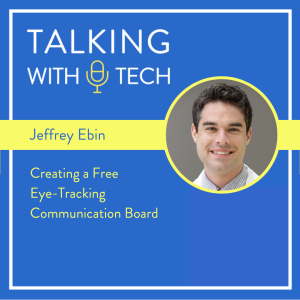
Wednesday May 04, 2022
Wednesday May 04, 2022
This week, Rachel interviews Dr. Jeffrey Ebin, an inventor and ER doctor at the University of Houston who created a FREE eye-tracking communication board (communicatonboard.io) that requires no more equipment than a camera (e.g. on a phone/tablet) and a web browser! Jeffrey shares all about his interest in creating Assistive Technology solutions, and how helping a man who was paralyzed from the neck down started him thinking about a free eye gaze website. One great thing about his communication board, particularly in the hospital setting, is the user can pick it up and learn it quickly without needing a lot of training for themselves or communication partners.
Before the interview, Chris and Rachel discuss a scenario that may be familiar to people who support AAC users - when we see someone with their AAC device in public, is it appropriate to go and talk to them (and/or their family) about it? Chris saw an AAC user at his daughter’s play and wanted to go and talk to them, but he hesitated and decided not to say anything. Rachel shares similar situations she has experienced, and the uncertainty that many SLPs feel when they are deciding whether to talk about communication outside of the clinical or school setting.
Key ideas this week:
🔑 Some of the vocabulary on the communication board is more specific to a hospital setting (e.g. suction), but there are plans for making the vocabulary customizable in the future.
🔑 The communication board (communicationboard.io) can be combined with an inexpensive receiver to operate things like light switches.
🔑 According to Dr. Ebin, a lot of the tech we are using in the field of assistive technology is outdated by 10-15 years, and in many cases much more expensive than similar technology in other fields. He believes we need to better incorporate the advances we are making in other areas of technology into assistive technlogy.
Visit talkingwithtech.org to access previous episodes, resources, and CEU credits that you can earn for listening to TWT episodes!
Help us develop new content and keep the podcast going strong! Support our podcast at patreon.com/talkingwithtech!
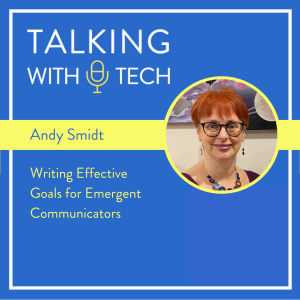
Wednesday Apr 27, 2022
Wednesday Apr 27, 2022
This week, we hear from Dr. Andy Smidt, a professor at the University of Sydney who teaches a number of courses related to communication and supporting people with severe intellectual disabilities. Andy shares about teaching pre-service professionals in unique ways, her “TEAM” taxonomy that can help write goals for emergent (presymbolic) communicators, and more!
Before the interview, Rachel and Chris talk about playing “The Mind”, a card game where you only use observation and nonverbal communication to sequence a set of cards together. They reflect on what they learned playing this game, including how essential nonverbal communication is to our everyday lives and how we can learn to observe very subtle signals. They also share about how we can observe nonverbal communication and then attach language to it in a therapeutic setting.
Key ideas this week:
🔑How do we support someone with severe intellectual disabilities who is presymbolic and may never become symbolic? We can presume their potential, but becoming a symbolic communicator may take a long time. How do we write goals to be worked on right now? Andy came up with the TEAM taxonomy for goal writing that is useful when working with pre-symbolic communicators:
T = Train, e.g. train communication partners
E = Expand, e.g. expanding what the AAC use already does. Expand the people they interact with, the activities they participate in, the situation in which the person uses potential communicative acts, expand the people who can interpret these communicative acts.
A= Augment, e.g. add something new. Allow the person to make choices in their daily routine. Add in new object symbols, community request cards, etc.
M= Move, e.g. for the person to move to become intentional or symbolic.
🔑In some cases, we need to regroup when we have hit a roadblock and look back at the TEAM framework. You might want to give it a few months and not add anything new - the AAC user may need a break to get comfortable with what they have already learned.
🔑Most clinicians feel they are doing family centered practice, but research indicates most families would say their therapy is not family centered. Family centered practice means going at the speed of the family, which may be slow if that is what they need.
Links from this Episode:
Full Text of Andy's article on the TEAM process
The Mind Card Game
Visit talkingwithtech.org to access previous episodes, resources, and CEU credits that you can earn for listening to TWT episodes!
Help us develop new content and keep the podcast going strong! Support our podcast at patreon.com/talkingwithtech!
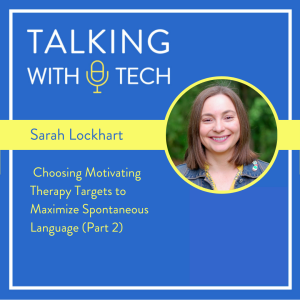
Wednesday Apr 20, 2022
Wednesday Apr 20, 2022
This week, we share Part 2 of Rachel’s interview with SLP and host of the SLP Happy Hour podcast, Sarah Lockhart! They continue their discussion of Sarah’s clients, including a nonverbal client who uses lots of scripts to communicate. Rachel shares ideas for how to choose targets for therapy, why we should be modeling language that is important to the AAC user, and how motivating materials during AAC assessment can help get a better picture of his or her true ability.
Before the interview, Chris and Rachel finish answering the question from last week about a student with a complex medical history that includes cortical visual impairment (CVI). Chris and Rachel discuss ideas for using books and TV shows the student loves to make therapy more fun, including watching YouTube and eliciting language from the video. They also talk about what to look at when the student isn’t making progress, including whether or not the activity they are doing is fun.
Key ideas this week:
🔑 When modeling, are you showing them language they might want to use? For example, it may be better to model “I don’t want to wake up” for a teenager than “Good Morning Mom”. Both are important, but, in this case, a modeled protest may be used spontaneously more readily than a greeting.
🔑 The most valid assessment is one in which the AAC user is motivated to engage - if we are assessing but forcing the student to label something uninteresting, they may not demonstrate their true skills.
🔑 How can we figure out where to start teaching language? One idea is to look at how AAC users are communicating nonverbally. If a child is already demonstrating non-verbal communication, it is an easy transition to giving them language to use instead of that gesture or action.
🔑 What are other ideas for choosing targets? Ask the communication partners - what does the student do all the time when no one is around? It can give us insight into what they are motivated by, such as sensory seeking behavior or refusal, which can then give you insight into targets and activities.
Links from this week’s episode:
Talking with Tech Episodes related to CVI: https://www.talkingwithtech.org/search?q=CVI
For resources related to coding, go to Code.org
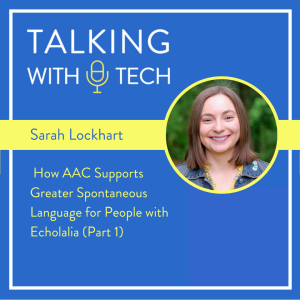
Thursday Apr 14, 2022
Thursday Apr 14, 2022
This week, Rachel interviews Sarah Lockhart, an SLP and host of the SLP Happy Hour podcast. Sarah had questions about providing AAC to a student who has limited spontaneous communication but used lots of scripts. Rachel and Sarah discuss the importance of supporting independent communication for echolalic students, how AAC benefits these students by providing visual word choices with auditory feedback, and more!
Before the interview, Chris and Rachel discuss a listener question about a student with a complex medical history, including CVI, who uses an eye gaze system. Rachel and Chris touch on how they would approach the case and some specific things that come to mind, including the challenges of directly prompting an eye gaze user, ideas for using games to teach language, and how they could use Canva in therapy to make something useful for the student’s school.
Key ideas this week:
🔑 If a student relies on us to open a folder on their device, how can it generalize to independence? It’s especially tempting to help an eye tracking user, but If we aren’t training from a motor plan approach, it may not generalize. If we start with supports, we need to fade them as soon as possible so they get the full motor plan.
🔑 It doesn’t move the needle for spontaneous autonomous speech to verbally say what we think they want to say and have them repeat that over and over again. In many cases this hasn’t worked for years.
🔑 You can support independent communication with AAC in ways you can’t with verbal speech alone, such as gesturing at the device with an expectant gaze
Visit talkingwithtech.org to access previous episodes, resources, and CEU credits that you can earn for listening to TWT episodes!
Help us develop new content and keep the podcast going strong! Support our podcast at patreon.com/talkingwithtech!
Links from this weeks episode:
Episode 147: Kaylie Gustafson: Supporting Eye Gaze Users Through Telepractice https://www.talkingwithtech.org/episodes/kaylie-gustafson?rq=Eye
Pepi's Wonder World: https://www.pepiplay.com/wonderworld/
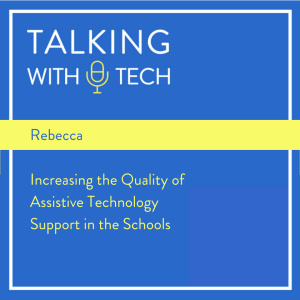
Wednesday Apr 06, 2022
Wednesday Apr 06, 2022
This week, Chris interviews Rebecca, a guest who requested to keep her last name anonymous. Rebecca is an assistive technology professional who supports a K-12 school district and was interested in putting together some information for her school board asking to increase the number of assistive technology specialists in her district. She and Chris break down some arguments for increasing the quality of AT in the schools, as well as topics like providing direct service minutes vs. coaching, how to calculate the impact you are having on the entire student body (not just students with IEPs), working together with staff development professionals for trainings, and more!
Before the interview, Rachel and Chris have a lively discussion about a hypothetical classroom with one AAC user who has some sensory seeking behaviors. Rachel and Chris go through their thoughts about the case, including how to approach the teacher, how to support language while also keeping the kids and the staff safe, and providing alternative sensory experiences for the student that may help avoid some of the sensory seeking behaviors.
Key ideas this week:
🔑 One argument for increasing the number of AT/AAC Specialists - there is a lot of time spent selecting the tool, but not much follow through on how to implement that tool. if you need better AAC implementation across the district, you may need to have a dedicated person for coaching.
🔑 Another argument for increasing the number of AAC Specialists - look at the numbers over the previous few years regarding the number of AT and AAC requests you are getting. In many districts, the numbers are growing rapidly.
🔑 There is a huge overlap between accommodations and assistive technology on an IEP - it may make sense to approach the IEP by writing “accommodations reflect AT considerations” under AT considerations, then exploring AT with the team as part of the accommodations discussion.
Help us develop new content and keep the podcast going strong! Support our podcast at patreon.com/talkingwithtech!
Visit talkingwithtech.org to access previous episodes, resources, and CEU credits that you can earn for listening to TWT episodes!

Wednesday Mar 30, 2022
Wednesday Mar 30, 2022
This week, we share Chris’s conversation with Mai Ling Chan and Jeanette Washington on making our presentations and trainings more engaging and effective! Chris, Mai Ling, and Jeanette are seasoned presenters, and they have a ton of useful tips that you can use to improve your presentations right away!
Before the interview, Rachel shares about a client who was moved to tears by a sad video that he saw, but was confused about what was happening when he was crying - he wondered if someone was cutting onions. Chris and Rachel talk about engaging kids with experiences that teach them to anchor abstract emotional concepts with something that is real for them, like how it makes their bodies feel or how they feel when grandma leaves.
Key ideas this week:
🔑 It is more important to engage with your audience well rather than focusing on having “pretty” slides. Also, from an accessibility standpoint, it can be more difficult to follow slides that have lots of animations and graphics that don’t really add to the experience.
🔑 Instead of putting several bullet points on a slide, you can just take each bullet and make it its own slide. This makes it less distracting and allows the audience to follow along with you at the same speed.
🔑 Most presentations are three act plays - the first act is a problem we are working to solve, the second act is strategies we can put together to solve the problem, and third act is the action plan and takeaways.
Help us develop new content and keep the podcast going strong! Support our podcast at patreon.com/talkingwithtech!
Visit talkingwithtech.org to access previous episodes, resources, and CEU credits that you can earn for listening to TWT episodes!
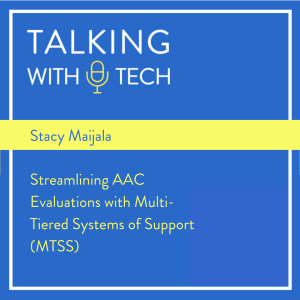
Wednesday Mar 23, 2022
Wednesday Mar 23, 2022
This week, Chris interviews Stacey Maijala, an SLP who recently started a new AT Specialist position in Michigan that supports 13 school districts and five transition programs. Stacey had lots of questions for Chris about creating a lending library for technology, providing AT and AAC to everyone through Multi-Tiered Systems of Support (MTSS), informing teachers about Tier 1 resources (i.e. resources available to everyone without the need for an evaluation or special education eligibility), and more!
Before the interview, Chris and Rachel discuss a patreon users question - is it OK to choose one particular AAC software application (eg. LAMP WFL, Proloquo2Go) as your “go-to” choice for new AAC users? Chris and Rachel describe the “system first approach” and why that is a valid reason for choosing one system over others. Chris and Rachel also touch upon making one AAC app your “Tier 1” option if you are using a Multi-Tiered Systems of Support model.
Key ideas this week:
🔑 You can inform teachers and staff about some of the AT solutions available in your district through a monthly or weekly “tech tips” blog or newsletter that shares some of the strategies and supports that are available to everyone (i.e. Tier 1). You can also send an automatic email reply when they ask for an AAC evaluation that reminds them of all of the resources available without an evaluation.
🔑 AT Specialists and SLPs are “are not Amazon” - they don’t just fill orders for technology. Rather, AT Specialists can help the team come to a consensus decision about what strategies and tools to employ for a potential AAC user. Act as a facilitator and ask questions to help draw out answers from the team.
🔑 If you are creating a lending library, start with technology and tools that are very specialized to one person (e.g. Tier 3 tools), like switch activated toys or braille materials. Trialing AAC devices for a short period makes less sense, because proper implementation takes much longer than a couple weeks. If we have chosen the tool carefully as a team, we need to give the student enough time to learn to use it before we decide if we need to change the tool.
Help us develop new content and keep the podcast going strong! Support our podcast at patreon.com/talkingwithtech!
Visit talkingwithtech.org to access previous episodes, resources, and CEU credits that you can earn for listening to TWT episodes!
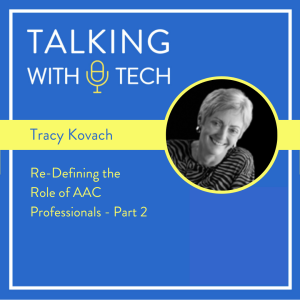
Wednesday Mar 16, 2022
Wednesday Mar 16, 2022
This week, we share Part 2 of Chris’s interview with Tracy Kovach! Tracy is an SLP and AAC specialist who has over 30 years of experience with AAC. She shares about helping Bruce Baker organize the Pittsburgh Augmentative and Alternative Language Seminar Series (PALSS), changes we should make to pre-service education (e.g. university classes), how implementation might change with brain-interface systems, and more!
Before the interview, Chris and Rachel answer a Patreon member’s questions about working with students who use AAC in a rural district. This listener had questions about creating a tool to help highlight symbols they want AAC users to focus on. She also had questions about choosing a core board to use as a universal support for everyone, and if she should limit the number of icons to make the layout less distracting for students.
Key ideas this week:
🔑 When teaching about AAC at the pre-service education level, we should be focusing on teaching students that AAC intervention is, to a large extent, language intervention. Previously, a large amount of effort was focused on teaching how to operate and program AAC systems, which may not be the most effective approach. The devices might change, but the need to teach language skills stays the same.
🔑 If you are working at a school campus, consider creating a “communication club” for students that meets regularly to support AAC users on campus. This is an authentic problem that some students could really get interested in helping out with. Club members could create and distribute core boards for the school, learn how to be a good communication partner, and practice modeling.
🔑 If Tracy could share one thing about AAC with everyone, she would share “AAC is not magic.” Just because you get the system, doesn’t mean it works right out of the box. Getting the device is only the beginning. AAC implementation is a lot of work and it doesn’t happen without lots of dedication and effort from both the AAC user and the user’s circle of support.
Links from this Episode
Minspeak’s Successful AAC Outcomes Seminars: https://minspeak.com/outcomes/
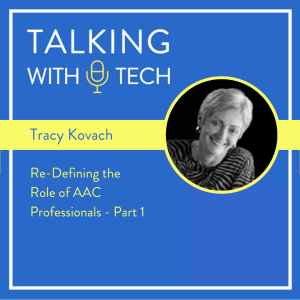
Wednesday Mar 09, 2022
Wednesday Mar 09, 2022
This week, Chris interviews the Tracy Kovach, an SLP and AAC specialist with a wealth of experience working as an SLP supporting complex communication needs. She shares about working with AAC when it was in its early years, the important of training communication partners, how SLPs and other professionals can advocate for changes in their profession, and more!
Before the interview, Chris and Rachel have a fascinating discussion about Lego Braille Bricks (legobraillebricks.com), a service that provides free Lego Braille sets to help teach Braille to people with visual impairments. Chris shares about how the free lessons on the website make learning Braille fun, keeping this set in mind as we support people with visual impairments, and the importance of learning through play!
Key Ideas this Week:
🔑 There is such high turnover in staff, someone working on language development might have 7-10 therapists or more. If we can train the communication partners, then there can be a consistent source of support and implementation despite staff turnover.
🔑 Professionals who work with AAC need to think carefully about how their role is defined as it relates to communication partner training. There needs to have some kind of position statement saying that these professional’s role is, in part, to instruct communication partners and is not just direct contact.
🔑 If SLPs and AAC Specialists can point to something that they are using systematically coach communication partners, it can help administrators understand that the SLPs and AAC Specialists are not making up with something new every week off the top of their head.
Help us develop new content and keep the podcast going strong! Support our podcast at patreon.com/talkingwithtech!
Visit talkingwithtech.org to access previous episodes, resources, and CEU credits that you can earn for listening to TWT episodes!
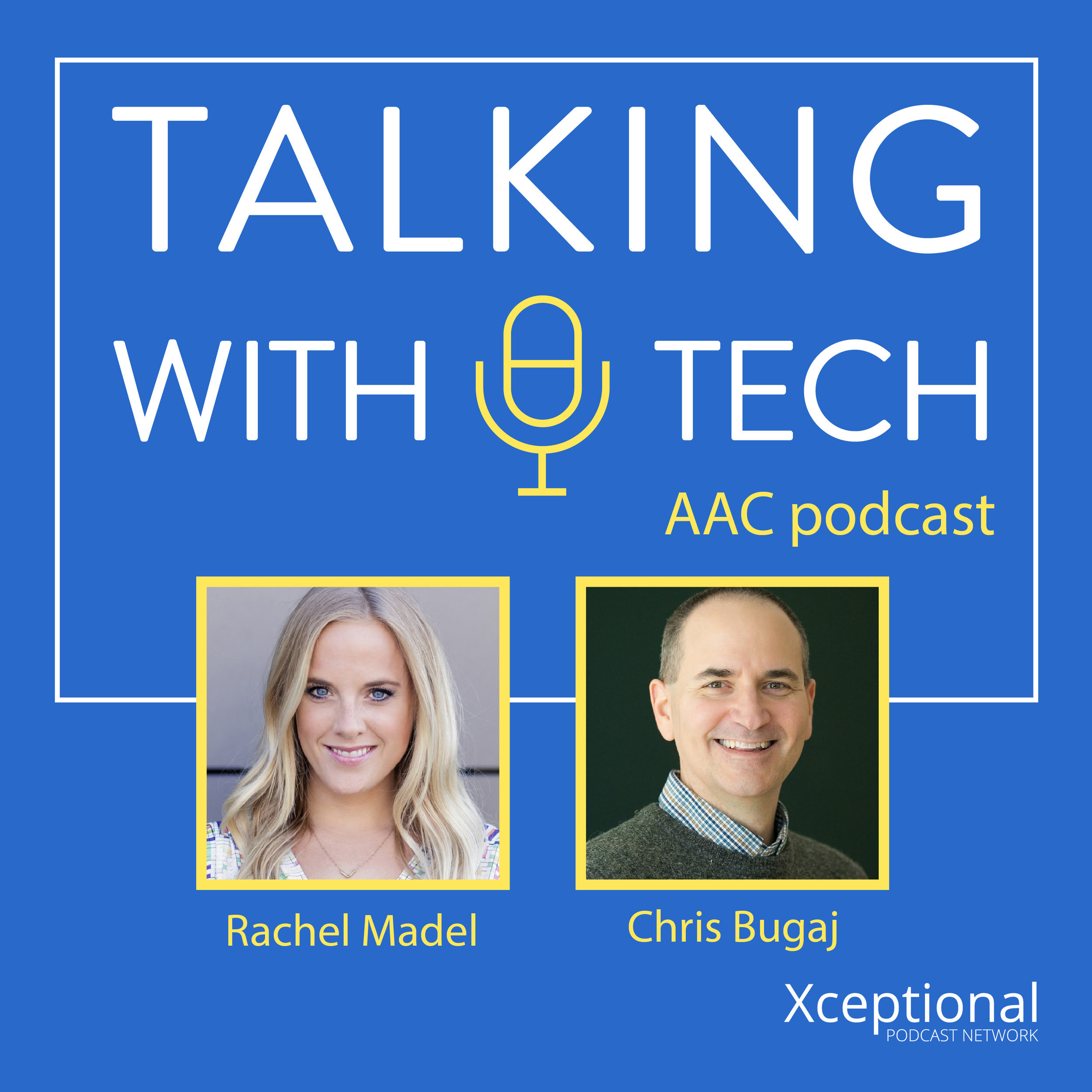
Join AAC experts Rachel Madel and Chris Bugaj as they dive into a weekly discussion about all things AAC (Augmentative and Alternative Communication). Every episode they deliver practical resources, clinical guidelines and relevant research to help clinicians better utilize technology for individuals with complex communication needs.
Episodes include interviews with industry thought-leaders, clinicians, parents, researchers and app developers to keep you on the pulse of the educational technology scene and better support communication through the use of technology.


